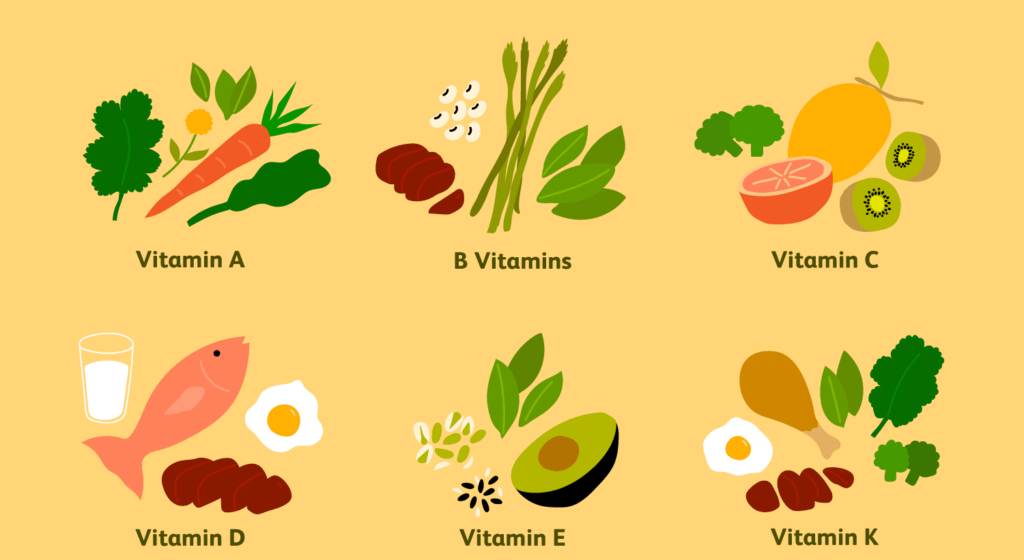14-year-olds are beginning to be more independent and take control of their own lives, which may include taking responsibility for what they eat. Should that include taking vitamins?
Table of Contents
Vitamins 101
Vitamins are chemicals that our bodies need to function properly. There are 13 vitamins that humans need in order for the body to operate normally, and these can be divided into two groups: water soluble and fat soluble.
These vitamins include B1, B2, B3, vitamin C, folate or folic acid, vitamin D, E, K1 (phylloquinone), K2 (menaquinone), biotin, and pantothenic acid.
People often take supplements of certain vitamins when they do not get enough of them through their regular diet.
For example, if someone does not eat salads every day then they may choose to supplement with Vitamin A; this is actually recommended by most doctors because unless you’re living in a bubble, it is quite hard to get through your daily diet without ingesting at least some of these vitamins in your regular meals.
People may also supplement with Vitamin C when they are sick; this vitamin helps the immune system respond faster which means that you will be well sooner rather than later.
Of course, there are certain health conditions for which you should not take supplements (for example if you’re pregnant). A doctor or pharmacist can tell you whether or not taking vitamins is right for you depending on what type of supplement it is and why you need it.
But do teenagers really need all of these nutrients? Is there evidence to support the use of supplements in healthy children over the age of 14 years old? Read the following facts sheet and decide for yourself.
Teenagers and Vitamins
There has been a growing interest in the use of vitamins and supplements in teenagers, but at what age can you really start taking them?
Is it helpful to take supplements during teenage years when the body is rapidly growing and developing or do teenagers really not need them?
The National Health Service (NHS) in the UK states that it is possible to get all of your nutrients from a balanced diet.
This means eating a range of different foods, including fruit and vegetables, meat, fish, eggs dairy products, and nuts. There are also dietary supplements available for teenagers who may feel they need extra help to gain all the energy they need to support their growth.
The NHS website states that there is no evidence to support the use of dietary supplements in children who are over the age of 14 years old, but if you are interested in taking them for whatever reason it is important to speak with your doctor or pharmacist before doing so.
On the other hand, there are many doctors and scientists who think that taking vitamins is a good idea, if only because the quality of modern food is not what it used to be.
Years ago people actually ate foods with higher nutrient contents – vegetables were grown in soil that had more nutrients in it, they didn’t cook their food at temperatures high enough to burn away all the nutrients, and farm animals were given natural feeds that contained high levels of certain minerals.
Nowadays most meat you buy from your local supermarket has been intensively farmed and pumped full of antibiotics; monoculture farming means that crops have been grown in soil where most of the nutrients have been leached out sometime during the last few decades, but this isn’t by long periods spent being transported on the back of a lorry or a ship which does a lot more damage to the food in question.
Of course, this line of thinking is not without its detractors. There are many people out there who say that having optimal nutrition from zeroing in on certain nutrients will undermine the importance of eating a balanced diet and lead teenagers to fall foul of faddy diets.
On top of that, some vitamins can actually be harmful if taken at the wrong dosage or by people with specific health conditions (for example Gremlins should avoid Vitamin A).
Whichever side you take it is hard to deny the fact that human beings today do not eat as well as they once did; junk food has become so pervasive in our culture, children spend so much eating bad food so vitamins are a good idea.
So Should 14-year-old take vitamins?
It is generally recommended by health care professionals including doctors and nurses for teens to take a daily multivitamin. This will ensure that the teen has the required nutrients in their bodies and can help them grow into healthy adults if they continue to take it every day.
Additionally, since teenagers often make food choices based on impulses such as cravings or emotions rather than logic, the multivitamin provides a little bit of insurance against any recommended nutrient intake not being met when eating fast food or other such foods with little nutritional value.
What if they don’t want to take vitamins?
However, there are options that don’t include a multivitamin. Teenagers that do not want to take the multivitamin can still get most of the nutrients from whole grains, fruits and vegetables, meat, dairy products, and other foods. A liquid vitamin may be a good option for some teens.
Despite the fact that taking vitamins is beneficial in many ways, it’s also important to remember that too much of a good thing can have negative consequences.
Taking high doses of certain vitamins could actually be harmful to teens’ health so they need to choose their vitamins appropriately.
It is clear that even though taking total responsibility for one’s own diet isn’t always easy when old enough to drive, but teens should seriously consider taking a daily multivitamin especially if making food choices impulsively.
Conclusion
In conclusion, a multivitamin is definitely recommended for 14-year-olds but since too much of a good thing can be bad as well, teens need to pay attention to the number of vitamins they are taking in and make sure that they are not consuming an amount that could put them at risk for health issues.





